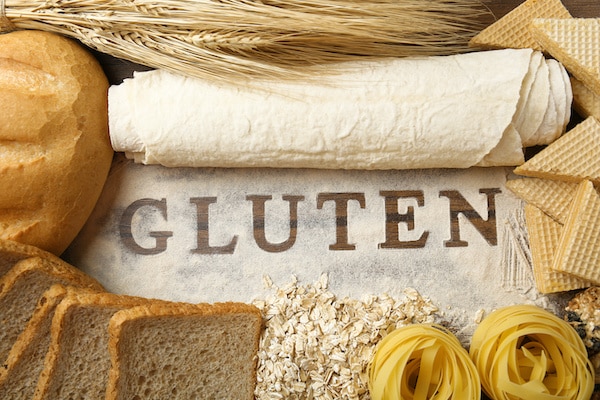You can’t have avoided the bad press that gluten has had over the last few years. In fact 1 in 10 of us in the UK have now gone ‘gluten free’ (as well as a host of popular celebrities).
And the ‘free from’ food industry has exploded to keep up with demand. In 2018 this market reported a 27% rise in sales.
But if you’re not diagnosed with Coeliac disease (where you need to be 100% GF), is it that bad for you? And do you need to avoid it?
The answer as always is; it depends!
You can watch the video below or listen to the podcast;
What is gluten?
Gluten is a group of proteins found in grains such as wheat, rye, barley and spelt. The main proteins in it are gliadin and glutenin, with gliadin mostly responsible for the negative effects.
Conditions
Coeliac Disease; around 1% of the population have been diagnosed with Coeliac Disease (CD), an autoimmune reaction to gliadin proteins and enzymes in the gut. Eating gluten causes the immune system to attack it, as well as the lignin of your gut, causing damage to your villi (Total Villous Atrophy). And leading to potential digestive issues, nutrient deficiencies, anaemia, and increased risk of other Auto Immune diseases.
The problem is that the test for CD is only positive where you have complete villous atrophy (ie the very end stage of this disease). For every person diagnosed with CD, there are thought to be another 6 people that could have the disease but haven’t been diagnosed or they have had a negative test due to the fact that they only have partial damage OR they react to different gluten peptides.
Non-Coeliac Gluten Sensitivity (NCGS); this is the most common and under-recognised form of gluten related disorder. Where CD is the tip of the iceberg, the ‘end stage’ of gluten sensitivity, there is a whole array of issues that gluten can cause either on the way to or even without ever reaching CD itself. This is referred to as NCGS and is now a recognised medical condition for those testing negative for CD.
Wheat Allergy; this is an immune (not autoimmune) reaction to wheat ( a true allergy). It involves IgE antibodies that attack the wheat proteins. You may be allergic to wheat, but be fine with other grains. You may also have both wheat allergy AND gluten sensitivity however.
Common Symptoms of Gluten Sensitivity
Symptoms of gluten sensitivity or intolerance are not restricted to the gut. Where you can have digestive issues such as IBS, diarrhoea, constipation, bloating, gas, pain, it’s not always gut related. Symptoms can include fatigue, brain fog, headaches, hormonal issues, weight gain, mood issues, joint pain, skin issues and more.
In fact, because it can cause inflammation, symptoms can show up pretty much anywhere in the body.
Underlying Factors
Genetics – the HLA gene is a good predictor of gluten sensitivity. 99% of those with Coeliac disease, and 60% of those with NCGS have a version of the HLA gene that indicates increased risk, compared to only 30% of the general population.
Your Microbiome – dysbiosis (imbalance in your gut flora) can set the stage for gluten (and other) sensitivities.
Leaky gut – gluten can disrupt zonulin, the protein that regulates the opening and closing of the gut wall cells, allowing over-activation of the immune system. This can lead to auto immune conditions.
Should you avoid gluten?
If you don’t have any digestive issues, niggling unexplained symptoms or chronic health issues, or been diagnosed with Coeliac Disease, then there’s no reason to avoid gluten.
However, if you suffer from IBS or have any digestive issues, or you have unexplained symptoms that you can’t resolve, and you're negative for Coeliac Disease, then you should try an elimination diet.
Elimination diet
Still the best way to know if you have any intolerance is to remove gluten containing foods (and drinks) from your diet for a minimum of 30 days, then re-introduce it. If symptoms improve during elimination then return on re-introducing it, your body is telling you something!
I always recommend removing dairy too for the 30 days, as sensitivity can also indicate an intolerance to dairy (particularly casein).
Check out our 30 days to happy Hormones online programme which includes gluten and dairy free elimination guidelines.
Testing
If you suspect you have an issue with gluten, you should get tested for Coeliac disease and Wheat Allergy first and foremost. If those are negative, it doesn’t mean you don’t have a sensitivity to it!
Unfortunately there is no standard medical test for gluten sensitivity, however we use a US lab that very accurately identifies antibodies to all 12 gluten peptides (conventional Coeliac testing only looks at gliadin and transglutaminase antibodies) – plus up to 20 common foods that can cross-react.
Contact us for more details if you want to know more on testing or our 30 day online programme.

